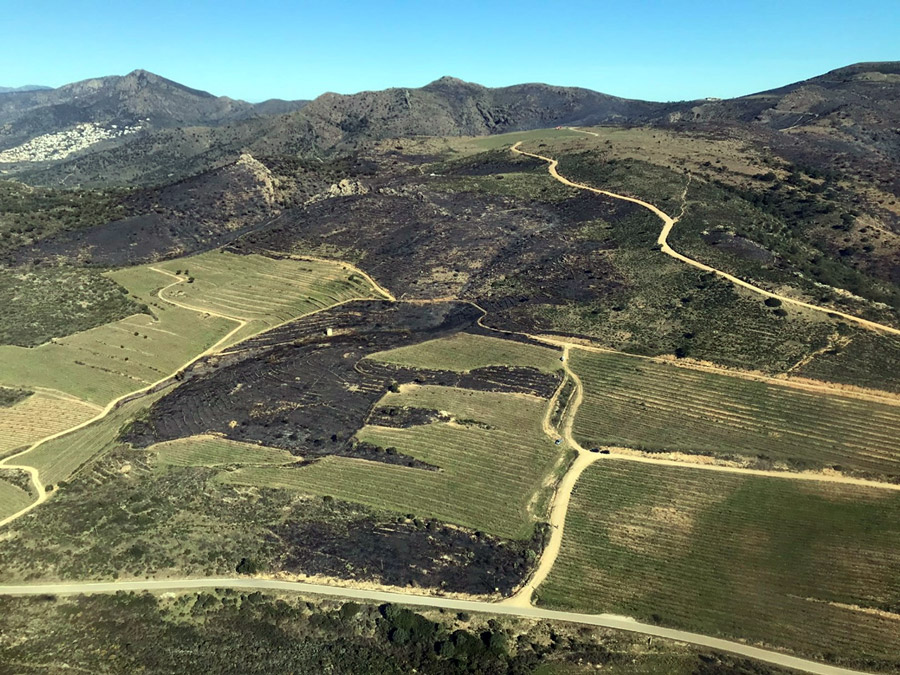
Discover how agroforestry mosaic landscapes in La Plana de Manlleu, Catalonia, Northeastern Spain, with multifunctional vineyard firebreak buffers, prevent wildfires while offering socio-economic benefits and enhancing ecosystem services.
In the Mediterranean region, increasing temperatures and aridity have amplified the threat and frequency of wildfires, inflicting significant damage and costs. Traditional fire mitigation approaches often carry uncertain expenses. However, introducing innovative strategies such as firebreak buffers and utilising low-flammability crops like vineyards in managed wildlands, can offer a dual advantage of wildfire prevention and socio-economic benefits.
In Catalonia’s Pla de Manlleu, a rural and mountainous terrain adorned with expansive forests and vineyards, the significance of environmental preservation intertwines with agricultural practices. The vineyards here are renowned not only for their exceptional quality but also for their environmental contributions. Raïm +500, a farmer association, has taken proactive steps to cultivate grapes above 500 metres altitude across three municipalities, located in a designated Biodistrict. Their objective goes beyond mere cultivation; it includes defining, preserving, and promoting the region’s unique characteristics.
Raïm +500: a beacon of resilience
The essence of the Biodistrict lies in its elevation above 500 metres, encompassing lands belonging to Pla de Manlleu and neighbouring municipalities. Approximately 50 families inhabit this area, with the majority dedicated to ecological and sustainable viticulture. The +500 Zone, as it’s referred to, is committed to a sustainable territorial model focused on balanced agro-forestry practices, economic viability, and community engagement.
To bolster landscape resilience amid escalating wildfire threats, the +500 zone embarked on a multifaceted project. Initially concentrating on implementing mosaic agroforestry practices, efforts evolved to optimise forest management around vineyard firebreaks. Collaborating closely with Catalan firefighters, the project aims to enhance accessibility for firefighting efforts while simultaneously reducing fire intensity and facilitating control within vineyard perimeters.
Vineyards acting as firebreaks in Mas Marés; Cap de Creus (by Espelt Cellar). Photo: Corps of Firefighters of Catalonia.
Charting the path forward: catalysing landscape resilience
The success of the Raïm +500 initiative is palpable, evidenced by the increasing demand for quality wineries and the declining average age of winegrowers. While the project of using vineyards as fire barriers in Pla de Manlleu is in its nascent stages, success in other Catalan regions underscores its feasibility. Initiatives like Mas Marès from Espelt Cellar effectively integrate agriculture and nature, creating a resilient barrier against forest fires. Agriculture plays a pivotal role in establishing natural firebreaks, reducing fuel accumulation, and enhancing fire management capabilities.
Moreover, the Fire Wine project exemplifies the ongoing efforts to enhance landscape resilience against wildfires. By evaluating innovation incentives within the wine sector’s value chain, projects like this aim to minimise losses and foster a sustainable future. Through collaborative efforts between farmers, firefighters, and local communities, Catalonia’s landscape is evolving into a resilient tapestry of vineyards and forests, safeguarding against the ravages of wildfires while sustaining its ecological and economic vitality.
Visit ResAlliance’s official website
This article was originally written by:
The Institute of Agrifood Research and Technology (IRTA)
Photo credits (featured image): Angela Llop (Flickr)
The post Creating mosaic landscapes: integrating vineyards to prevent wildfires and increase resilience appeared first on Resilience Blog.